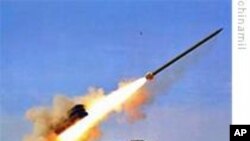October 1, 2009 is the 60th anniversary of the People's Republic of China, and the nation's armed forces will take part in a massive program celebrating the Communist Party's takeover in 1949. U.S. officials have carefully watched China's efforts to modernize its military in recent years and are concerned it could pose a threat to America's military power in the Pacific.
For more than a decade, China has been rapidly modernizing the People's Liberation Army. And U.S. officials have expressed concern about how Beijing might use its expanding military power.
China's Defense Minister, Liang Guanglie said recently that his country's armed forces have made such huge strides in modernization that China's fighter jets, tanks, warships and ballistic missiles equal or come close to matching the arsenals of Western nations.
The United States uses fleets of aircraft carriers, submarines, and other military assets to project power in the Pacific region.
Military analysts warn that China is trying to develop a new anti-ship ballistic missile that could threaten the U.S. Navy's ability to stage operations close to China.
Roger Cliff focuses on Chinese military strategy at the RAND Corporation here in Washington.
"U.S. surface ships, including U.S. aircraft carrier strike groups that are within about 1,000 miles of China's coast, are going to be vulnerable to attack by aircraft, surface ships and submarines," said Roger Cliff.
While China's relations with Taiwan have improved in recent months, Beijing continues to add to the hundreds of missiles it has pointed at the island.
But the Pentagon's 2009 report on China's military power ranks the country's defense technology below that of the United States.
Retired U.S. Navy Rear Admiral Eric McVadon is Director of Asia-Pacific Studies at the Institute for Foreign Policy Analysis.
"It is a very difficult thing to imagine a two-pronged campaign - one against Taiwan and one against an intervening American force, of course, the world's only superpower," said Eric McVadon. "So China does not have the experience and the forces and so forth to expect to be able to do that very effectively. That would be truly a daunting challenge."
China says its military budget for this year is $70 billion, although the U.S. Defense Department estimates it could be as high as $150 billion.
The Pentagon says China's ability to sustain military power at a distance is limited. But top officials are concerned about Beijing's increased focus on nuclear, space and cyber warfare.
U.S. Defense Secretary Robert Gates:
"Their investments in cyber- and anti-satellite warfare, anti-air and anti-ship weaponry, and ballistic missiles could threaten America's primary way to project power and help allies in the Pacific - in particular, our forward air bases and carrier strike groups," said Secretary Gates.
But Beijing says China's military modernization is purely defensive in nature and aimed at protecting the country's security and interests.
Bernard Cole of the U.S. National Defense University.
"I really believe that the number one national security goal in China is simply keeping the Chinese Communist Party in power," said Bernard Cole.
The United States and China recently renewed military-to-military cooperation, which, in the past, has involved U.S Navy ships visiting Chinese ports and meetings between officers.
The Commander of U.S. forces in the Pacific, Admiral Timothy Keating, says he would like to go a step further to include joint military exercises.
"I happen to believe that partnership is an essential element of stability throughout the Asia-Pacific region," said Admiral Keating. "And a way of demonstrating that is to operate on a multilateral basis, with forces from the People's Liberation Army, Navy and Air Force."
Analysts also suggest the U.S. and Chinese militaries cooperate to provide humanitarian assistance and disaster relief during emergencies as a way to build trust and confidence between the two nations.
Eric McVadon of the Institute for Foreign Policy Analysis:
"For the moment, we have to hedge," he said. "Both sides have to hedge because we are fearful that a conflict could arise. But the more that we cooperate and engage, maybe the less important it becomes to hedge. So that is my optimistic viewpoint for the future."
U.S. defense officials have long expressed concerns about the lack of transparency in China's military affairs.
In an attempt to better communicate its military intentions, China's Defense Ministry recently launched its first Web site http://www.mod.gov.cn in Chinese and English that contains numerous links to military news, photographs and videos.
News
US Concerned About China's Military Modernization
update

<!-- IMAGE -->





